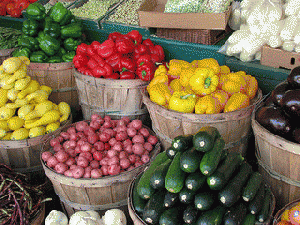Reprinted from organicconsumers.org By Ronnie Cummins and Katherine Paul
In 2011, we wrote an article exposing the then-popular trend in food marketing--promoting "local" foods as "sustainable," "healthy" or "natural," even when they weren't.
Fast forward a couple of years, and we see that sales of "local" food are still on the rise, as are sales of "natural" and more recently, "Non-GMO" foods. And today, just as they were a few years ago, consumers are still being duped by corporations that use these labels to pass off products as something they aren't.
The fact is, none of these labels--local, natural or non-GMO--on its own provide a guarantee that the food behind the label is either healthy, sustainable or natural. There is only one food label that provides that guarantee: USDA Organic. And because organic food sourced locally is not only healthy, sustainable and natural, but also supports small farmers and contributes to strong communities, today's Gold Standard for the health-conscious and environmentally and socially concerned consumer is USDA organic and local.
Local, but is it better?
Sales of local food grew from about $1 billion in 2005 to nearly $7 billion in 2013, according to the U.S. Department of Agriculture.
Consumer demand is the primary driver of local food sales. But what's driving consumer preference?
In its new report, "Organic & Natural 2014," The Hartman Group claims that the "authenticity halo around organic and natural has begun to fade, and local foods and beverages are poised to surpass them as a symbol of trust and transparency."
If organic's halo is fading, it's not by accident. Over the past few years, the corporate food and biotech industries have stepped up their attacks on the organic label, largely in response to consumer concerns about genetically engineered foods. Industry has a vested interest in tarnishing organics. After all, the organic label guarantees a food product is GMO-free. And with nearly 80 percent of all processed foods containing GMOs (genetically modified organisms), Big Food has good reason to steer consumers away from organic.
Assuming some consumers have grown skeptical of the organic label, what leads them to put their trust instead in "local" food?
Citing The Hartman Group report again:
People believe in the integrity of local producers and small farmers, seeing them as deeply invested in the quality of their products. Their trust is bolstered by the close proximity of local food sources, which translates into shorter distances traveled--and thus a perception of greater freshness. They like keeping their money in the community and the idea that they are eating food that's in season.
Supporting local farmers. Keeping money in the community. Eating fresher, in-season food. These are all good reasons to buy local.
But absent any definition of "local" other than specifying the distance food is allowed to travel between farm to supermarket or farmers market or restaurant, what's the basis for consumer trust in local producers and farmers? Or the quality of their products?
(Note: You can view every article as one long page if you sign up as an Advocate Member, or higher).






